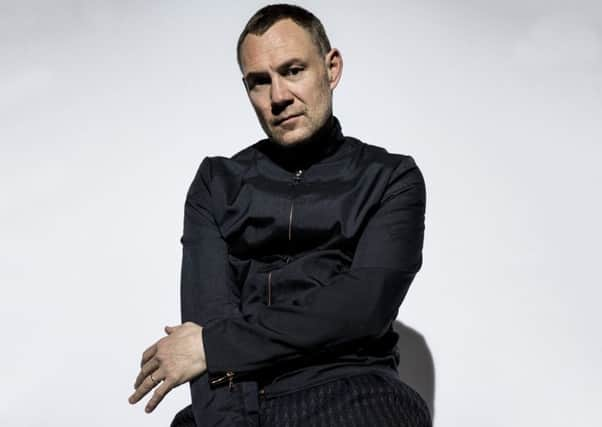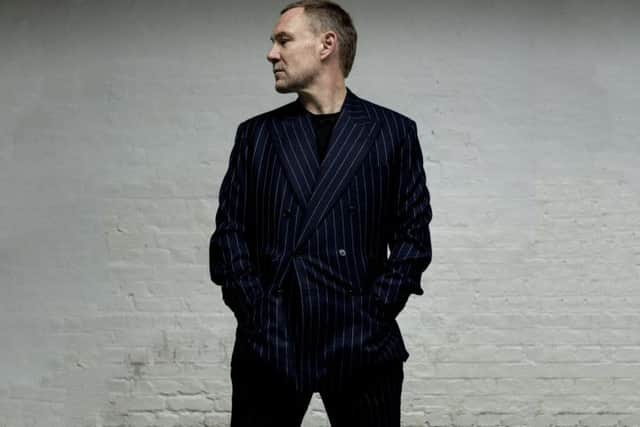David Gray: ‘I’m an avid reader, it constantly brings ideas into my head that end up in songs’


David Gray might, in his own words, have found 2018 “a bit of a mindwarper” yet, as he prepares to release his first studio album in five years, the singer-songwriter, who scored enormous success at the turn of the Millennium with his albums White Ladder and A New Day At Midnight, sounds philosophical.
“It was a year to be got through,” he says of 12 months in which he found himself confronted by “a whole conglomeration of things – some of them personal, some of them business, some legal stuff” which he’d rather not go into in detail but evidently seems glad to have put them behind him. “I’m through into 2019,” he chuckles. “Luckily this one looks just as mental.”
Advertisement
Hide AdAdvertisement
Hide AdAmid everything, Gray turned 50. “A few bits are falling off but I’m still here,” he quips, going on to explain how much he enjoyed his birthday party last June. “We were blessed by superb weather and it was a real proper celebration.


“To be honest, life gets richer if anything in experience,” he reflects. “But of course there are unforeseen things – health things, personal things, family things. The longer you keep going the more this stuff seems to happen. There’s a certain sense to that – the wear and tear as one gets a little bit older – but I’m enjoying it. Once I got to 40 I realised I was just counting in tens until I got to 50, so I let my hair down, what’s left of it.”
Gold in a Brass Age, Gray’s 11th album – in a career that began in 1993 – is named after a short story by the American writer Raymond Carver. He admits to regularly delving into literature for inspiration. “I’m an avid reader,” he says. “It constantly brings ideas into my head that end up in songs; it’s vital, actually. I do more reading than I do listening to music. It’s hugely influential in terms of channelling my thoughts in a certain direction.
“For a few years I read tons of books about [Antarctic explorers] Shackleton and Scott. I don’t know why, I guess it was coming up to the anniversary of the doomed Scott mission. I started by buying the book South by Ernest Shackleton which was about that incredible thing when they all managed to escape alive despite having their boat crushed by ice. I jumped from things like that to loads of nature literature and then I’ve just been reading stuff about the making of Britain both geologically and culturally, when it was populated and the history of the population and how climate change destroyed communities as they grew, the flickering flower of language beginning to take root around the campfire.
Advertisement
Hide AdAdvertisement
Hide Ad“All these things are massive, they feed the imagination, really powerful stuff which will come to light in a song, so yes, it’s a really fertile area for me.”
In recent years Gray, who was born in Sale but raised in Pembrokeshire, has found himself shifting from a storytelling style of lyric writing to a more poetic approach. “I’ve got that in my writing, I’m painterly, if you like. I like to bring colour into the language. Perhaps I was a little more extravagant when I started out but the adjectives have been pared back and I like to find colour in words, they’re so vivid to me, they’re almost like hallucinations. A good phrase lives in my mind in a way that is almost visual.
“Songwriting is an imaginative process first of all, it’s governed by the rules of music and writing as well as by the rules of emotive force. If the emotional force is gripping the song can be crude and from the heart and still work but as you refine your processes you realise even an act of apparent confession is still an act of imaginative creation and that is a distance away from your actual feelings, which is precisely why this thing can exist. You’re not regurgitating your feelings all the time, but music is made of emotion, it’s the mathematics of emotion, so I guess as I’ve gone on I’m regarding things from a little bit of a distance.
“I know I’m disgorging huge amounts of emotion and feeling but I generally try and step back, and a part of that has been to step away from narrative and verse-chorus, any predictability that was basically putting me to sleep, it also brings you into direct comparison with other songs that you’re written – is this as good as Please Forgive Me or Babylon or Sail Away or Nemesis or From Here You Can Almost See the Sea?
Advertisement
Hide AdAdvertisement
Hide Ad“What’s compelling is why is this narrative so important, what have I got to say. I avoid that entirely by this massive collage/montage process of cut and paste. I take notes then I lay them out and I start to see where things line up and I sense the thrust of an idea to hang the whole thing on, like Sapling – it’s a cyclical time song and I found all these images and I wrapped them all together around a song and then it’s not even a chorus but a second section that went somewhere else, just as a release from this little mechanism. So my process has changed, working from lyrics first, it takes the horrible dread of judgment, the self-consciousness out of the process, I’m working intuitively, playfully within the ideas and then I can stand back at the end of it and see what it all adds up to, and if I’m not happy with it I don’t have to use it.
“My process defaults more to risk and uncertainty and the unknown, step off into ideas and when you don’t quite know what you’re doing it’s generally a good sign. It’s taken me a long time to arrive at that point but that’s basically where I’m at.”
The song Furthering uses Autotune in a similar manner to the Grammy Award winning US singer songwriter Bon Iver. “We went looking for something that didn’t sound like me,” Gray says. “That part was added. We had the song and then the embers of the end section, this little jam, where we looped a bit of stray guitar then the producer Ben [De Vries] started to put some chords under it and this beautiful bit of synth programming. Suddenly I was like, ‘Wow, I’ve got an idea, let me in the vocal booth’, and then I listened back and said ‘It’s too normal, stick a gated thing across it’, we had a vocal thing during the song which flutters like a tremolo, so we used subtle gating which gets stronger as we get to the end section, so it’s partly that increasing and then we stuck some Autotune so I could go for some ridiculous notes and it just grew. I’m thinking of all the different voices, Vocoder sort of stuff, what do they call it? Neo-soul? It’s that kind of production which Bon Iver has used himself. It touches on a very different type of music which my music normally doesn’t go anywhere near but it just felt very natural.
“I’m always looking for a way to wriggle out of the confining elements which are the sound of an acoustic guitar and a piano or the sound of my voice above all other things. Although it’s the strength and the identity of what I do, I’m looking for different ways, singing softer, under harmonies, to make it a different temperature, a different colour, less blazing, cooler. That experimentation crosses into every song, the way it can be presented, double track or a sort of slap style, short reverb – I love that David Essex track [sings] ‘Hey you, rock ’n’ roll”, Serge Gainsbourg, those kind of records, a short reverb on the tom tom, there’s something mega about it. It’s a very indicative part of what the recording sessions were like and I think that’s one of our favourites for the way it came out.”
Advertisement
Hide AdAdvertisement
Hide AdGray has said he feels Gold In A Brass Age feels more like a ‘London record’ than any he’s made since White Ladder. Indeed some of the city’s architecture features on a moth’s wings on the album’s cover. He finds himself fascinated by the energy of the capital. “What else is there to hang on to?” he says. “It’s a crazy, tumultuous environment really, when you stop and look at it. You think you know what you’re getting into but if you open your eyes and ears and mind you find an incredible deluge of information – human, personal, commercial – just the noise and squeal of it all, it’s a crush in every way. In order to cope with that and make yourself still a person, with the theatricality that comes with London - you watch things being torn down which were part of your relationship with the city, the relentless pace, like the Astoria, half of the space above Oxford Street has been ripped down, Vauxhall is like Shanghai suddenly – as a coping strategy there’s a kind of detachment, there is a humour, there’s a warmth that still flickers of a community in Soho and some of these other places and I feel connected to that.
“Ben, who I made the record with, lives right in the centre of town, virtually by Centrepoint, and I gave him free rein to bring his quirk into the party at every stage in the recording once we’d built up the confidence and there’s something very urban out it, this cheeky way of programming and reusing the past, sampling with a little bit of humour. I love that audacity that the city has as a means of survival. Hand in hand with that there’s a theatricality. I like to wear clothes, I like to look like something, make a shape, not like all the other bodies, make them stop, make them think about what you’re wearing, who you are. It enables all these things. If you did that in my village [where I grew up] in Wales you could get your head kicked in, in the 70s and 80s I think that was just the norm, thankfully that’s eased off, mind you we’ve got other problems now.
“So yes, I’ve got a multi-faceted relationship to being here, most of which is very positive, and I do feed off the energy, the amount that’s here that you can tap into, but I’m essentially a country boy at heart and I restore myself by getting the hell of here. It’s like trying to escape the gravitational pull of a planet, getting out of London, fighting your way through the traffic to breathe some fresh air. It’s not easy to escape its clutches sometimes. But I’ve got to get out from time to time or I start to lose my mind, but I feel this record has got that cheekiness, that tear-it-down-and-build-it-up-again creativity about it, it feels like a part of this town, I don’t think it could have been made anywhere else.”
Gold in a Brass Age is out on March 8. David Gray plays at York Barbican on March 30. www.davidgray.com